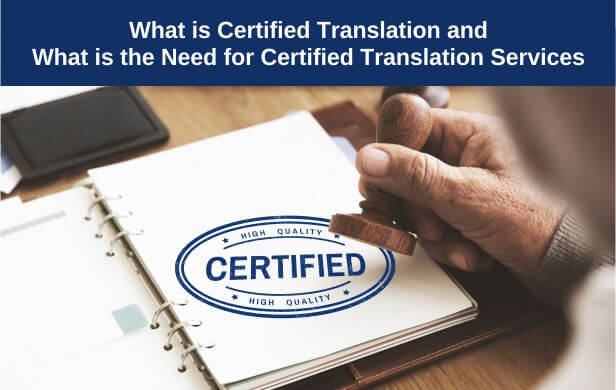
Most individuals have never seen or heard of certified translation services. They would only need such services if they intend to migrate to another nation, such as the United States, or if they wish to enroll in a foreign university. In such circumstances, they must produce certified translations of all non-English supporting papers.
People are often perplexed by certified translation, so we wish to explain what exactly it is.
A certified translation consists of the translated document and a signed declaration created by the translator or translation company indicating that the translation is a complete and accurate rendering of the original or source text. The certificate of accuracy is the name given to the statement.
This does not imply that a translator must be 'certified' in order to perform certified translations.
It should be noted that unlike other countries, in India, there is no Central body or Authority for licensing, authorisation or certification of translation agencies. Therefore there is no Government authorised translation agency in India.
The certification proves that the document was translated by a professional translator rather than an ad hoc translator. Legal and official entities need certified translations.
Suppose you are a foreigner and need to submit documents issuedin a foreign language to a regulatory agency, an immigration service agency, a court of law, or an educational institution. In that case, you will need certified translation services. The standards for certified translation differ. Some authorities demand notarized certified translations. Others need the professional translator's résumé or qualifications to be included.
A certified translation is often used for legal purposes, such as immigration, college applications, and corporate and economic transactions. The following are some examples of documents that may require certified translations:
The source material should be directly translated in its entirety for certified translation. The translated document should include commas, periods, dashes, and other symbols such as stamps, seals, and signatures. The translator inserts a "not legible" mark if any parts are unclear.
The translated document's visual format should be the same as the source document's. Seals, stamps, and other markings should be translated in their original place.
The following documents constitute a certified translation.
The original or a copy of the document in the source language
The document's translation into the target language
The Certificate of Accuracy attesting to the translator's capacity to perform translation services, the full name of the translator or translation agency, the translation agency's seal, the date, and the signature of the translator or translation agency representative.
Despite their similar names, a "certified translator" document is not the same as a "certified translation." A certified translator is someone who has passed a certification exam to demonstrate his or her professional translation skills in a specific language. Not all languages offer a certification exam, and not all countries or projects require certified translators. A "certified translation," on the other hand, is a signed statement that ensures translation accuracy and can be created by non-certified translators, certified translators, or a language solutions partner.
Unlike a certified translation, a notarized translation is entirely about following official protocol and does not have the same quality assurance standards. Notaries are not obligated to approve the translation's quality before approval. Notaries are simply required to validate the translator's identification, swear under oath that the translated document is accurate, and have the translator sign an affidavit. The notary then signs and stamps the translated document with an official seal. School transcripts and foreign diplomas are official documents that frequently require notarized translations rather than certified ones.
Language Services Bureau has long standing experience of 43+ years in the language industry and our certified translations are accepted in almost all embassies, consulates, government offices, colleges and universities in India and abroad. If you are seeking for a translation agency that can satisfy all of your needs, please contact us right now.
For any queries related to language translation services. Inquire at our email address below or give us a call today!
info@languageservicesbureau.com
Telephone: +91-20-24470509, +91-82370 60559
Similar articles for you...

आमच्या गेल्या महिन्यातील ब्लॉग मध्ये भाषांचे ज्ञान आवश्यक असणाऱ्या करियर क्षेत्रांची माहिती आपल्याला मिळाली. जिथे भाषेचे ज्ञान फायद्याचे ठरते असे इतर व्यवसाय आपण या महिन्यात पाहुयात.

Posted by : Language Services Bureau

The time it takes to learn a language depends on what you want to do with it– here is a great article about language learning and the kind of expectations you can set about the time required for the same!